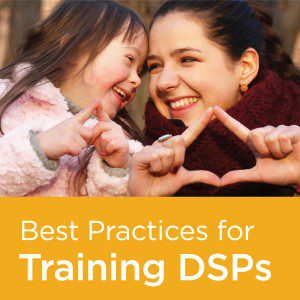Broadly speaking, staff training is about changing patterns of behavior from an over-reliance on habit and personal experience to the consistent implementation of best practices. Unfortunately, staff training often falls short of this goal. Why? Direct Support Professionals (DSPs), like most adult learners, want to be engaged in their job training and learn new skills best by building on their life experiences.
Yet many complain that the DSP skills training they are provided with is too far removed from their situation, or that their own way of providing support is better than what the “experts” say.
Give direct support professionals the skills they need
As COVID-19 has drastically changed the work that DSPs perform on a daily basis, today’s direct support professionals need to receive skills training that prepares them for the complex jobs ahead of them.
These changes range from a fear for their own personal safety to the increased risk on the physical and mental well-being of those they serve. Despite these challenges, DSPs still aren’t receiving the training they need to provide quality care during these difficult times.
By providing better training, organizations help their DSPs become more skilled practitioners, increasing the level of care offered to persons served. Not only that, but our 2021 Relias DSP Survey also found that DSPs who receive career advancement opportunities, including training, are more likely to stay with that organization. To increase your DSP retention rates, you must offer quality training options.
Direct support professional skills training focused on behavior change
Providing your direct support professionals with continuing education will empower your organization to provide better care to persons served and create a more stable and satisfied DSP workforce.
Building out these training plans, however, can feel like a daunting task. In this section, we will detail how to create easy-to-execute training plans for your DSPs using effective adult learning theory techniques. These techniques will help learners become and remain engaged in their training, while simultaneously improving their retention of the information presented.
Story-based learning
Story-based learning courses employ short vignettes and scenarios that let the learner make real-life decisions in situations they’re likely to face in their day-to-day jobs. Simple strategies put the learner “at risk” or use gamification to engage learners more fully in core content.
By employing this technique during training courses, it’s possible for direct support professionals to practice the skills they’re learning in a safe, low-risk environment. This will allow them to build confidence in their skillset prior to using these techniques in the field, leading to an increased level of care and better-quality outcomes for your organization.
Feedback delivers instructive content
Providing feedback to learners goes beyond “Correct” or “Try again.” Learner responses create a springboard to additional information, or how their choices play out in realistic terms. Be sure to provide helpful, thoughtful feedback during direct support professional training sessions.
Engaging content
Emotionally engaging courses reinforce the connection between the learner and the content, making the material relevant and meaningful — a powerful motivator for adult learners.
In addition, visually engaging designs that use visual cues and infographics can make content easy to understand, while purposeful image selection can help learners relate the material to real-world subjects and situations.
Free resources to combat COVID-19
Despite the proliferation of effective vaccines, COVID-19 promises to remain top-of-mind for healthcare providers for some time. That’s why Relias is continuing to offer free COVID-19-related courses, articles, and reports. We truly appreciate and respect the work of direct support professionals and want to support them, and their training needs, through this difficult time.
These resources cover the critical aspects of COVID-19 and infection control. We hope direct support professionals will find this knowledge and set of skills useful in keeping themselves and those they serve safe.
Put your DSP training into action
Have you taken the necessary steps to build on the competency and skill development of your direct support professionals? Do you have a training curriculum that is specifically built around what motivates your DSPs and ensures they have the skills they need?
Learn how Relias can help with DSP training, job satisfaction, and more.

The 2023 DSP Survey Report
Download the 2023 DSP Survey report to get even more data and insights on job satisfaction, recognition and appreciation, and career growth to improve DSP engagement and retention at your organization.
Download the White Paper →






